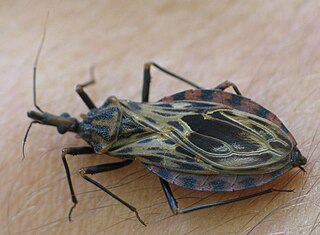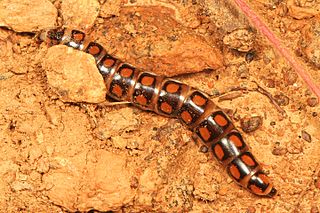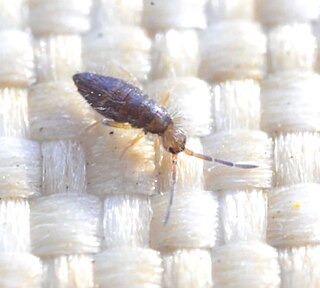
Triatoma nigromaculata is a sylvatic species of insect usually found in hollow trees, in vertebrate nests on trees and occasionally in human dwellings. It usually lives in relatively humid forests at high altitudes on mountain regions and foot hills. As all members of the subfamily Triatominae, T. nigromaculata is a blood-sucking bug and a potential vector of Chagas disease. This species is distributed mainly in Venezuela, but some specimens have also been found in Perú and Colombia (Cauca).
Cardioglossa nigromaculata is a species of frog in the family Arthroleptidae. It is found in the south-western Cameroon and in the extreme southern Nigeria at low altitudes. Common name blackspotted long-fingered frog has been coined for it.
Pseudoeurycea nigromaculata, commonly known as the black-spotted salamander or black-spotted false brook salamander is a species of salamander in the family Plethodontidae. It is endemic to Veracruz, Mexico, and known from Cerro Chicahuaxtla ) in Cuatlalpan and from Volcán San Martín at elevations of 1,200–1,300 m (3,900–4,300 ft). These separate populations likely represent distinct species.

Phlegopsis is a genus of insectivorous passerine birds in the antbird family, Thamnophilidae. They are known as "bare-eyes", which is a reference to a colourful bare patch of skin around their eyes. They are restricted to humid forest in the Amazon of South America. They are among the largest ant-followers in the family and are only rarely seen away from ant swarms.

The black-spotted bare-eye is a species of insectivore passerine bird in subfamily Thamnophilinae of family Thamnophilidae, the "typical antbirds". It is found in Bolivia, Brazil, Colombia, Ecuador, and Peru.
Ironomyiidae is a small family of flies in the order Diptera. Historically, they had been included in the family Platypezidae, and includes three extant species within the single extant genus Ironomyia endemic to Australia and a number of extinct fossil genera from North America and Asia extending back to the Early Cretaceous.
Tochuina nigromaculata is a species of dendronotid nudibranch. It is a marine gastropod mollusc in the family Tritoniidae.
Carposina nigromaculata is a moth of the family Carposinidae. It was first described by Lord Walsingham in 1907. It is endemic to the Hawaiian island of Oahu.

Endotricha is a genus of snout moths. It was described by Philipp Christoph Zeller in 1847.

Mictocommosis nigromaculata is a species of moth of the family Tortricidae. It is found in Japan, as well as Vietnam and Taiwan.
Falsocacia nigromaculata is a species of beetle in the family Cerambycidae, and the only species in the genus Falsocacia. It was described by Maurice Pic in 1944.
Poloma nigromaculata is a moth in the family Eupterotidae. It was described by Per Olof Christopher Aurivillius in 1893. It is found in South Africa.
Ceroplesis nigromaculata is a species of beetle in the family Cerambycidae. It was described by Per Olof Christopher Aurivillius in 1910. It is known from Kenya, Uganda, and Tanzania.

Zeale nigromaculata is a species of beetle in the family Cerambycidae. It was described by Johann Christoph Friedrich Klug in 1829. It is known from Argentina, Brazil, Paraguay, and Uruguay.
Anagelasta nigromaculata is a species of beetle in the family Cerambycidae. It was described by Stephan von Breuning in 1938. It is known from India.
Heteroglenea nigromaculata is a species of beetle in the family Cerambycidae. It was described by James Thomson in 1865. It is known from Laos, China, Thailand, Myanmar, Cambodia, Vietnam, Philippines and India. It feeds on Streblus asper.
Paratheocris nigromaculata is a species of beetle in the family Cerambycidae. It was described by Stephan von Breuning in 1938, originally under the genus Theocris. It is known from Gabon and the Democratic Republic of the Congo. It contains the varietas Paratheocris nigromaculata var. viridescens.

Phengodes nigromaculata is a species of glowworm beetle in the family Phengodidae. It is found in North America.

Willowsia platani is a species of slender springtail in the family Entomobryidae. It is found in Europe.

Willowsia buski, the damp grain springtail, is a species of slender springtail in the family Entomobryidae. It is found in abundance throughout North America and Europe, and likely has a cosmopolitan distribution. It can sometimes be found infesting stores of dry goods that have become contaminated with high moisture, giving rise to the name "damp grain springtail".









